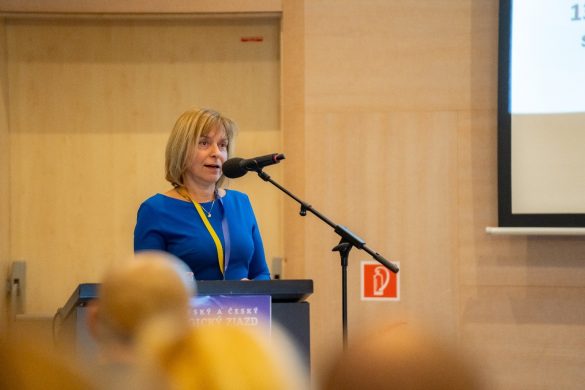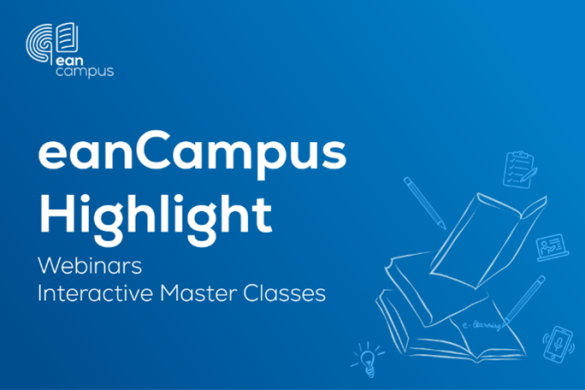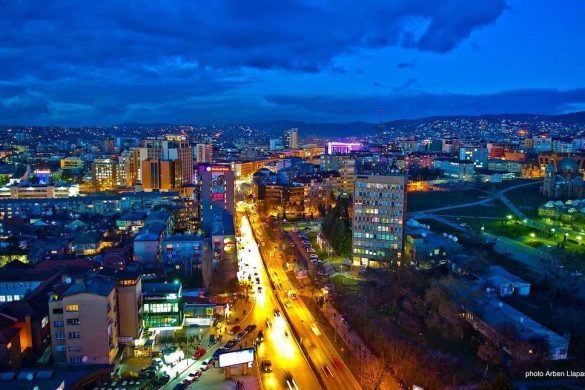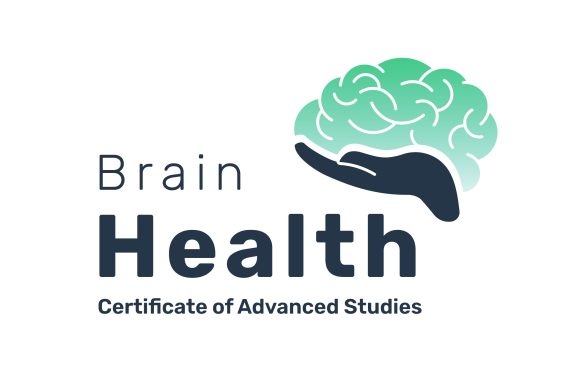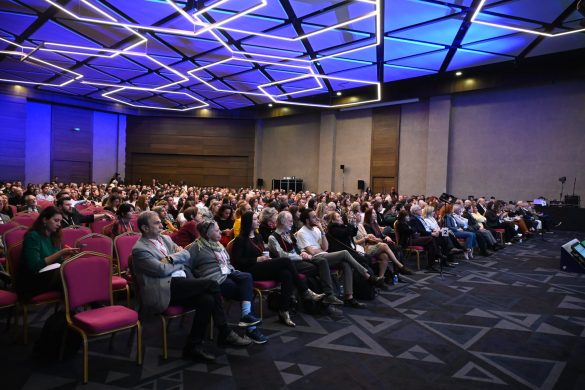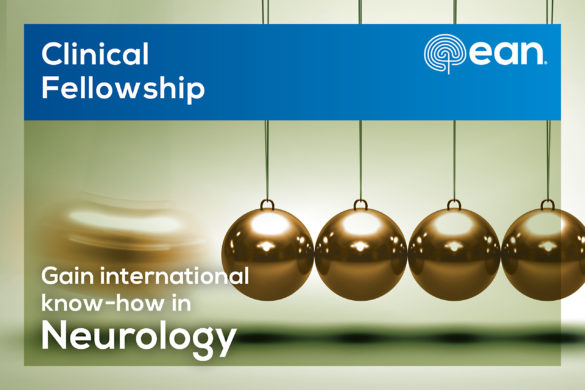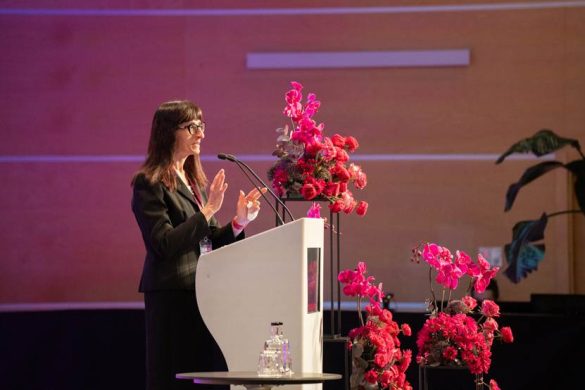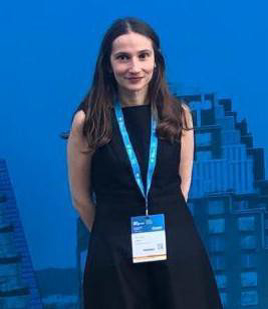
Antonia Lefter, Bucharest, Romania
Term of the Fellowship: 1.9. – 12.10.2021
Hosting department: Department of Neurology, Hopital Roger Salengro, University Hospital of Lille, France
Supervisor: Prof. Helene Zephir
I have attended a clinical fellowship of six weeks on multiple sclerosis (MS) and other neuroinflammatory diseases at Roger Salengro Hospital, Department of Neuroinflammatory Pathology in Lille, France, under the mentorship of Prof. Hélène Zéphir.
The department comprises two wards – day care and hospitalisation for diagnostic workup and management. During the time I spent on the former, I largely saw patients with MS receiving second-line disease-modifying therapies, such as natalizumab, ocrelizumab, or rituximab for primary progressive MS, but also patients with other neuroinflammatory diseases such as neuromyelitis optica spectrum disorder (NMOSD) on either rituximab, tocilizumab or even eculizumab, neurosarcoidosis, cerebral vasculitis, CLIPPERS, on specific immunosuppressants. Since some of the aforementioned therapeutics are not yet available in Romania, as is the case with NMOSD, this was a great opportunity to gain experience with these therapeutic protocols. On the latter ward, I followed the diagnostic process and overall management of many patients admitted on suspicion of a neuroinflammatory pathology, which was confirmed on numerous occasions. I would do the rounds daily alongside the seniors (Prof. Zéphir or Dr. Julie Boucher), residents and students on their neurology rotation, we would discuss the cases in detail, the investigational and therapeutic plans to be done, and see them through thereafter. There is genuine cohesion with the imaging department, where there are radiologists with high expertise in neuroinflammatory diseases of the central nervous system. Therefore, their input is extremely reliable and important, which optimises the diagnostic workup. I have had the opportunity to spend time in the neuroimaging department, where there is an MRI scanner used for research, and I am grateful to Dr. Olivier Otteryck for discussing with me several aspects of neurodiagnosis on certain acquisitions, for showing me the software they use to help them detect changes in the inflammatory lesional charge, and the optical coherence tomography (OCT) examinations that he performs as part of his research on optic nerve atrophy in MS patients.
I accompanied Prof. Zéphir and Dr. Boucher on their consultations and video consultations, and had interesting discussions with them about the patients with MS and other neuroinflammatory diseases that we saw. Moreover, I joined Prof. Zéphir in her biweekly virtual meetings with neurologists from other centres, organised to discuss difficult neuroinflammatory cases. This was an excellent opportunity to partake in engaging debates where various differential diagnosis issues concerning challenging cases were addressed. Additionally, I participated with Prof. Zéphir in a national multidisciplinary consultation meeting (i.e. RCP), which was held virtually, and attended by rheumatologists and internal medicine specialists, in order to reach consensus regarding complicated cases of autoimmune diseases.
Furthermore, I attended the weekly courses for residents and the weekly case presentations made by residents.
Not only has this fellowship enabled me to gain insight into the clinical practice of a highly proficient team of neuroinflammatory experts and to extend my knowledge in this field, but I was also able to learn about the healthcare and educational systems in France. In addition, Lille is a beautiful city worth discovering.
I am very grateful and I thank Prof. Zéphir for making this such a rewarding experience (for everything that she has done really), Dr. Boucher, and not least, their residents, for our constructive talks, their kind support and friendship: Manon Swiderski, Nicolas Berard, Jean-Christophe Lafontaine and Sean Freeman. I am glad to be keeping in touch with them for future projects. I also thank EAN for allowing me to be part of the Clinical Fellowship Programme.
Mateusz Robert Czyzycki, Dąbrowa Tarnowska, Poland
Term of the Fellowship: 14.6.-23.7.2021
Hosting department: Department of Neuro-oncology, University of Turin, Italy
Supervisor: Dr. Federica Franchino
Between 14 June and 23 July, 2021 I had the opportunity to participate in a clinical fellowship at the Department of Neuro-oncology in Turin led by Prof. Ricardo Soffietti.
Currently in Poland there is a big need for a place where neuro-oncological patients can get complex help. A clinical fellowship at the Department of Neuro-Oncology of the University Hospital in Turin, Italy gave me an opportunity to learn from Prof. Sofietti and his team, who are considered some of the best specialists in neuro-oncology.
During the stay, my supervisor was Federica Franchino M.D but I also had an opportunity to work with other extraordinary specialists like Allesia Pellerino M.D, Francesca Mo M.D, Franchesco Bruno M.D and even Professor Soffietti himself.
For most of the training, I participated as a member of the diagnostic and therapeutic team in caring for patients at the Outpatient Clinic. In this way, I had the opportunity to learn about the diagnostic methods used in the centre in Turin. Participation in the therapeutic process allowed me to learn about the methods of treatment used by local doctors and the principles of selecting the appropriate therapy that they apply in their work. Participation in the daily clinic routine gave me the opportunity to learn about the practical organisation of treatment. This fact will greatly facilitate attempts to transfer these experiences to the Polish system. I am very happy to say that the methods used in the Turin centre, with a slight modification, seem to be possible to implement in Poland and we are going to consider them when creating a similar unit in Poland.
In addition to working in the Outpatient Clinic, I also had the opportunity to participate in work on a stationary ward. There, I got acquainted with the elements of treatment and diagnostics that cannot be performed at the outpatient clinic. This knowledge and the principles of operation of such a department, allowed me to create the protocols of diagnosing similar patients in the clinical neurology department of our unit.
Another very informative event was the weekly console, which I had the opportunity to attend. Courtesy of Professor Soffietti, I also got permission to attend such councils in the neighbouring paediatric hospital. Thanks to this, I gained insight into the coordinated, multi-specialist care of neurooncological patients.
The stay at Professor Soffietti’s Department allowed me to learn about the principles of operation of the Neuro-oncology Clinic, a unit that does not exist in Poland at the moment. Although patients with brain cancer in our country are treated by oncologists, there is no centre that will provide them with comprehensive assistance. I attended this fellowship with the hope of getting to know such a place and I think that the plan has been realised. The enormous commitment and willingness to help both patients and myself, presented by the staff of the ward, made a huge impression on me. Thanks to this training, I also established contact with these outstanding specialists, which gives the possibility of cooperation to help Polish patients.
I should especially mention Allessia Pellerino M.D. who devoted a lot of time to me and passed on a lot of knowledge.
The only thing I regret was that the stay was so short that I could not get to know the topic better.
Referring to the non-medical aspects of the fellowship, I am happy to add that the grant fully covered the costs of accommodation and meals during the training.




